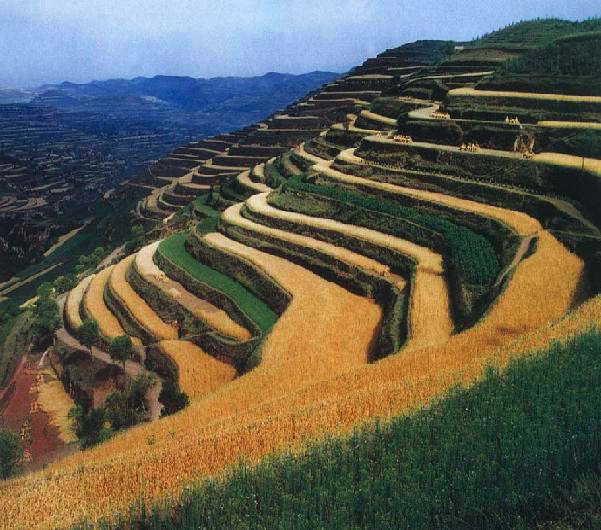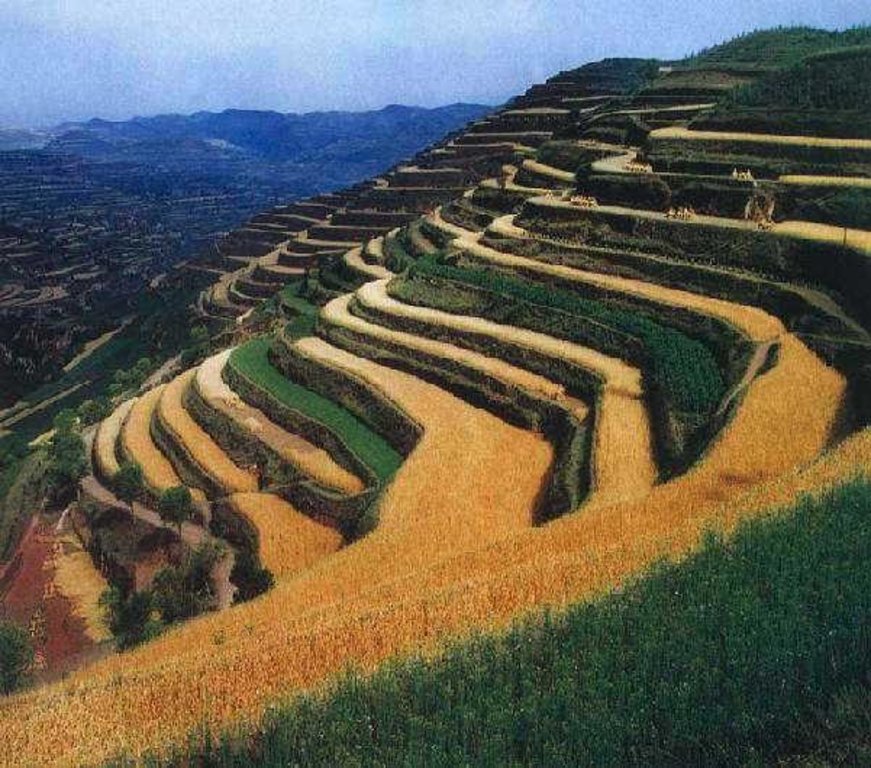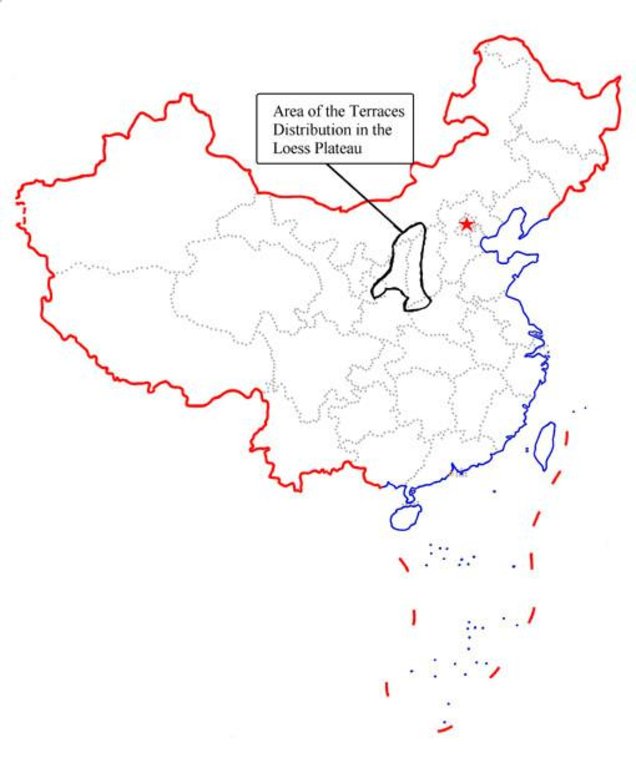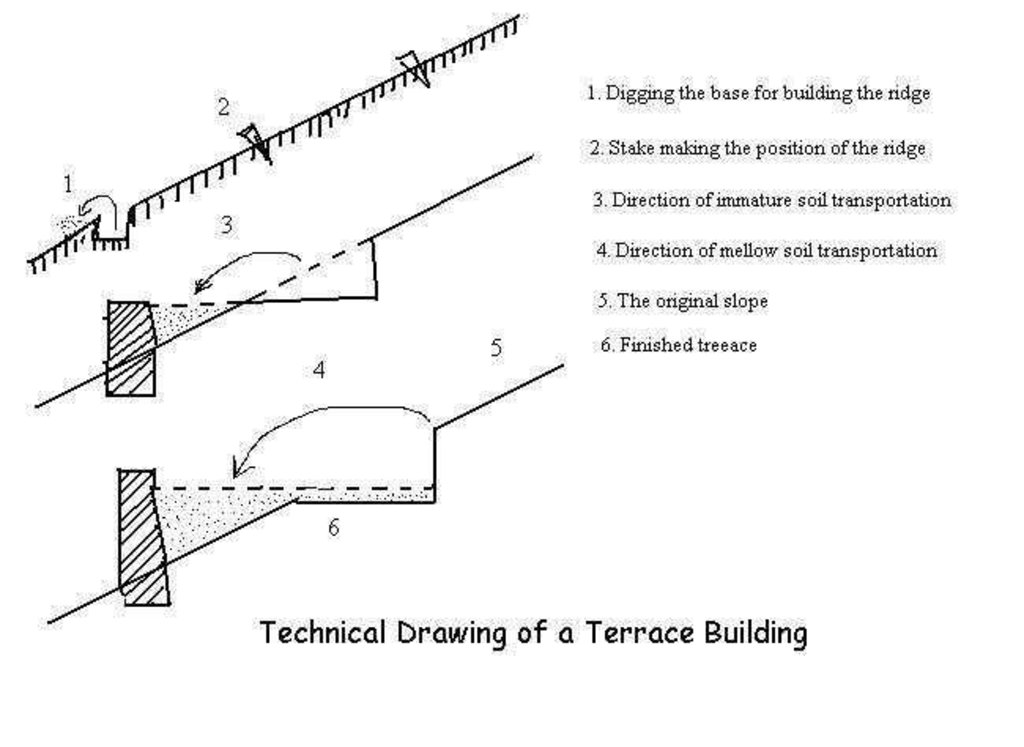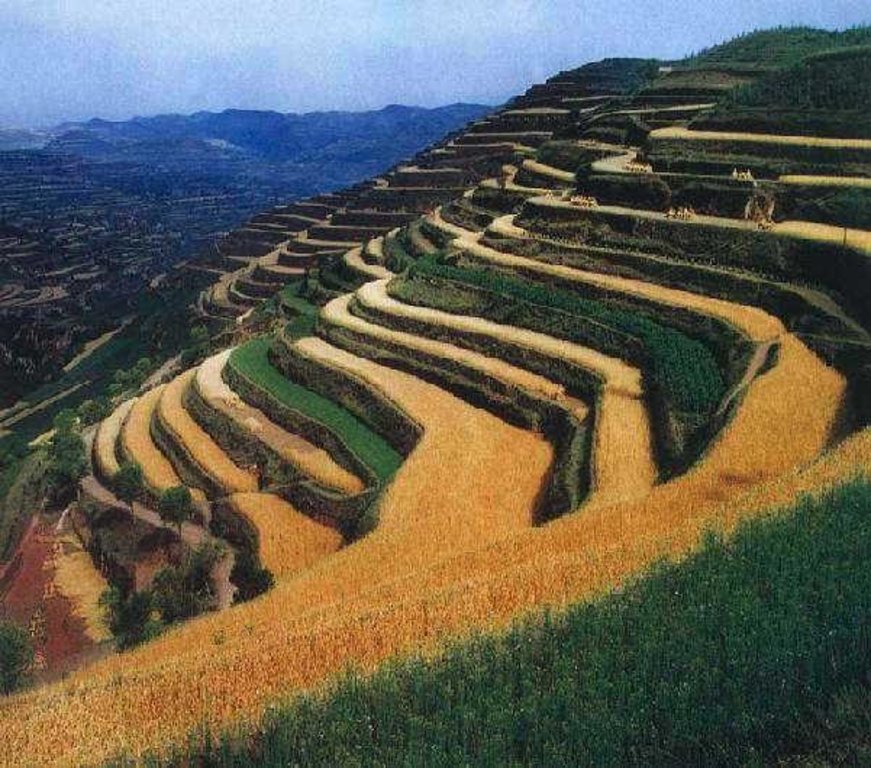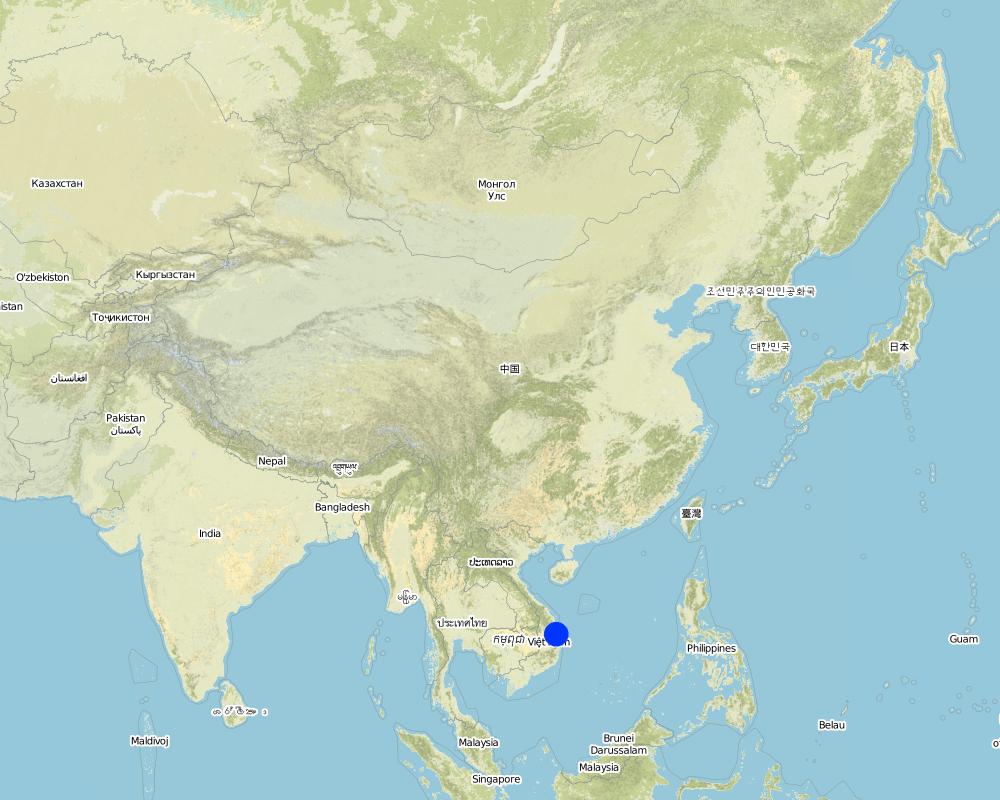Terrace [China]
- Creación:
- Actualización:
- Compilador: Meili WEN
- Editor: –
- Revisor: David Streiff
approaches_2394 - China
Visualizar secciones
Expandir todo Colapsar todos1. Información general
1.2 Detalles de contacto de las personas de referencia e instituciones involucradas en la evaluación y la documentación del Enfoque
Especialista MST:
Nombre de la(s) institución(es) que facilitaron la documentación/ evaluación del Enfoque si fuera relevante)
Department of Resources and Environmental Science, Beijing Normal University (Department of Resources and Environmental Science, Beijing Normal University) - China1.3 Condiciones referidas al uso de datos documentados mediante WOCAT
El compilador y la/s persona(s) de referencia claves aceptan las condiciones acerca del uso de los datos documentados mediante WOCAT :
Sí
2. Descripción del Enfoque MST
2.1 Breve descripción del Enfoque
Terraces are built on a slope land which as a raised bank made up of earth or stone with vertical or sloping sides and an approximately flat top to control soil erosion and preserve and enhance soil fertility.
2.2 Descripción detallada del Enfoque MST
Descripción detallada del Enfoque MST:
Aims / objectives: A terrace has a raised bank made up of earth or stone with vertical or sloping sides and a flat top. It can reduce slope angle and length, wrap runoff, increase infiltration and reduce soil loss. Crops can grow well because water increases in the soil. The ground cover is improved. Terraces can be constructed by manual labor or machine. Firstly, surveying the slope hills and determining width of terraces according to the slope angle and soil texture. Secondly, leveling up the slope and constructing the banks. Thirdly, maintaining. The terraces are implemented together by state, local A terrace has a raised bank of earth or stone with vertical or sloping sides and a approximately flat top. It can reduce slope angle and length, retain runoff, increase infiltration and reduce the soil loss. Crops can grow well because water increases in soils. Meanwhile, ground cover is improved. Terrace can be constructed by manual labor or machine. Firstly, determining the width of the field according to the slope angle and soil texture. Secondly, putting the topsoil aside. Thirdly, leveling up the slope and constructing banks. At last, putting the topsoil to the top of the flat surface.
2.3 Fotos del Enfoque
2.5 País/ región/ lugares donde el Enfoque fue aplicado
País:
China
Región/ Estado/ Provincia:
Shaanxi, Shanxi, Gansu, Henan, Inner Mongolia
Map
×2.6 Fechas de inicio y conclusión del Enfoque
Indique año del inicio:
1950
2.7 Tipo de Enfoque
- tradicional/ local
2.8 Propósitos/ objetivos principales del Enfoque
The Approach focused mainly on SLM with other activities (Increasing crop yield.)
The main objectives of the approach were conserving soil and water on slope land and enhancing soil fertility.
The SLM Approach addressed the following problems: Soil loss and land degradation, lack of fund and technology.
2.9 Condiciones que facilitan o impiden la implementación de la/s Tecnología/s aplicadas bajo el Enfoque
disponibilidad/ acceso a recursos y servicios financieros
- impiden
No enough money
Treatment through the SLM Approach: The national government partly fund, individual partly invests, local government partly invests.
marco de trabajo legal (tenencia de tierra, derechos de uso de tierra y agua)
- impiden
The existing land ownership, land use rights / water rights hindered a little the approach implementation The ownership of the land resources belongs to state and communities, land users can only lease the land for a period of time, they worry about their land would be transferred to others.
conocimiento de MST, acceso a apoyo técnico
- impiden
Poor knowledge for how to reduce the soil loss
Treatment through the SLM Approach: Ehancing SWC specialists guidance
otros
- impiden
Peasant worry about that they can not own the use right.
Treatment through the SLM Approach: The national government advocates whose who invest labors who get the benefits.
3. Participación y roles de las partes interesadas involucradas
3.1 Partes interesadas involucradas en el Enfoque y sus roles
- usuarios locales de tierras/ comunidades locales
Working land users were mainly men (Men are the main force for field work.)
Existing groups of land users
Experienced peasant may be involved in introducing the local situations.
Men know much more technical knowledge and skills than women.
If a terrace is constructed by machine, men and women are not different. If a terrace is constructed by manual labor, men can do more work.
- especialistas MST/consejeros agrícolas
- gobierno nacional (planificadores, autoridades)
3.2 Involucramiento de los usuarios locales de tierras/ comunidades locales en las distintas fases del Enfoque
| Involucramiento de los usuarios locales de tierras/ comunidades locales | Especifique quién se involucró y describa las actividades | |
|---|---|---|
| iniciación/ motivación | ninguno | rapid/participatory rural appraisal; The approach is a traditional way to harvest water and wrap soils, SWC applied land users easy to understand and accept it if some subsidy being obtained. |
| planificación | pasivo | interviews/questionnaires; Being involved in the planning. |
| implementación | auto-movilización | responsibility for minor steps; Being involved in the planning. |
| monitoreo y evaluación | pasivo | reporting; No participating. |
| Research | ninguno |
3.4 La toma de decisiones en la selección de Tecnología(s) MST
Especifique quién decidió la selección de las Tecnología/ Tecnologías a implementarse:
- principalmente por especialistas MST en consulta con usuarios de tierras
Explique:
consultative.
Decisions on the method of implementing the SLM Technology were made by by politicians / leaders. Generally, land users request. A proposal is prepared by SWC specialists or local government and submitted to leaders for being examined and approved.
4. Apoyo técnico, fortalecimiento institucional y gestión del conocimiento
4.1 Construcción de capacidades / capacitación
¿Se proporcionó la capacitación a usuarios de tierras/ otras partes interesadas?
Sí
Especifique quién fue capacitado:
- usuarios de tierras
- extensionists/trainers, politicians/decision makers
Forma de capacitación:
- de agricultor a agricultor
- áreas de demostración
- cursos
Temas avanzados:
Teaching them how to design and build terraces on a slope land etc.
4.2 Servicio de asesoría
¿Los usuarios de tierras tienen acceso a un servicio de asesoría?
Sí
Especifique si servicio proporcionado se realizó:
- en los campos de los usuarios de tierras
Describa/ comentarios:
Local government and SWC division.; Key elements: Demonstration, Visiting, Visiting; 1) Advisory service was carried out through: government's existing extension system 2) Advisory service was carried out through: government's existing extension system; Extension staff: mainly government employees 3) Target groups for extension: land users; Activities: Explain and demonstrate
Advisory service is quite adequate to ensure the continuation of land conservation activities; At each government level, there is a SWC division which is in charge of SWC activities including extension.
4.3 Fortalecimiento institucional (desarrollo institucional)
¿Se establecieron o fortalecieron instituciones mediante el Enfoque?
- sí, moderadamente
Especifique el nivel o los niveles en los que se fortalecieron o establecieron las instituciones:
- local
Especifique el tipo de apoyo:
- financiero
4.4 Monitoreo y evaluación
¿El monitoreo y la evaluación forman parte del Enfoque?
Sí
Comentarios:
bio-physical aspects were regular monitored by 0 through measurements; indicators: None
technical aspects were regular monitored by 0 through measurements; indicators: None
socio-cultural aspects were ad hoc monitored by 0 through observations; indicators: None
economic / production aspects were regular monitored by 0 through measurements; indicators: None
area treated aspects were regular monitored by 0 through measurements; indicators: None
no. of land users involved aspects were ad hoc monitored by 0 through measurements; indicators: None
management of Approach aspects were ad hoc monitored by 0 through observations; indicators: None
There were few changes in the Approach as a result of monitoring and evaluation: None
4.5 Investigación
¿La investigación formó parte del Enfoque?
Sí
Especifique los temas:
- economía/ marketing
- ecología
- tecnología
Proporcione detalles adicionales e indique quién hizo la investigación:
Research was carried out both on station and on-farm
5. Financiamiento y apoyo material externo
5.1 Presupuesto anual para el componente MST del Enfoque
Comentarios (ej. fuentes principales de financiamiento/ donantes principales):
Approach costs were met by the following donors: government (national - fund): 100.0%
5.2 Apoyo financiero/material proporcionado a los usuarios de tierras
¿Los usuarios de tierras recibieron financiamiento/ apoyo material para implementar la Tecnología/ Tecnologías? :
Sí
5.3 Subsidios para insumos específicos (incluyendo mano de obra)
- equipo
| Especifique qué insumos se subsidiaron | En qué grado | Especifique los subsidios |
|---|---|---|
| maquinaria | totalmente financiado | |
| herramientas | totalmente financiado | hand tools |
- agrícola
| Especifique qué insumos se subsidiaron | En qué grado | Especifique los subsidios |
|---|---|---|
| semillas | totalmente financiado | |
| fertilizantes | totalmente financiado | |
| seedlings and biocides | totalmente financiado | |
- infraestructura
| Especifique qué insumos se subsidiaron | En qué grado | Especifique los subsidios |
|---|---|---|
| community infrastructure | totalmente financiado | |
Si la mano de obra de usuarios de tierras fue un insumo sustancial, ¿fue:
- pagado en efectivo?
Comentarios:
do some work during the construction of the terrace
Labour was also rewarded with other material support
5.4 Crédito
¿Se proporcionó crédito bajo el Enfoque para actividades MST?
Sí
Especifique las condiciones (tasa de interés el apoyo, amortización, etc.):
Interest rate charged: 0.5%
Interest was lower than market rate.
6. Análisis de impacto y comentarios de conclusión
6.1 Impactos del Enfoque
¿El Enfoque ayudó a los usuarios de tierras a implementar y mantener Tecnologías MST?
- No
- Sí, un poco
- Sí, moderadamente
- Sí, mucho
Subsoiling and applying more manure and compost.
¿El Enfoque mejoró cuestiones de tenencia de tierra/ derechos de usuarios que obstaculizaron la implementación de la Tecnologías MST?
- No
- Sí, un poco
- Sí, moderadamente
- Sí, mucho
Persuading them to accept The problem is likely to be overcome in the near future. The relationship between land ownership and use rights can be properly dealt with by government and managers.
Did other land users / projects adopt the Approach?
- No
- Sí, un poco
- Sí, moderadamente
- Sí, mucho
According to the local situation, pits and check dam etc. also adopted in the approach.
6.3 Sostenibilidad de las actividades del Enfoque
¿Pueden los usuarios de tierras sostener lo que se implementó mediante el Enfoque (sin apoyo externo)?
- no
Si respondió no o incierto, especifique y comente:
no enough money and knowledge
6.4 Fortalezas/ ventajas del Enfoque
| Fuerzas/ ventajas/ oportunidades desde la perspectiva del usuario de la tierra |
|---|
| increase in production |
| Easier to till |
| Fuerzas/ ventajas/ oportunidades desde la perspectiva del compilador o de otra persona de referencia clave |
|---|
| Reduction of the slope angle (How to sustain/ enhance this strength: Raising terrace bank.) |
| reduction of the slope length (How to sustain/ enhance this strength: Protecting terrace banks by planting trees or others.) |
| Harvest of the runoff and increase in infiltration (How to sustain/ enhance this strength: Protecting the banks) |
| increase in soil fertility and organic matter (How to sustain/ enhance this strength: Applying manure and fertilizer) |
| improvement of ground cover (How to sustain/ enhance this strength: no till with mulching.) |
6.5 Debilidades/ desventajas del Enfoque y formas de sobreponerse a ellos
| Debilidades/ desventajas/ riesgos desde la perspectiva del usuario de la tierra | ¿Cómo sobreponerse a ellas? |
|---|---|
| Cost much. |
| Debilidades/ desventajas/ riesgos desde la perspectiva del compilador o de otra persona de referencia clave | ¿Cómo sobreponerse a ellas? |
|---|---|
| Decrease in production in the first1-2 year(s) | Fertilizering plenty of manure. |
| The ridge of the terrace is possible to be destroyed by storms and rats | Repairing and maintaining in time. |
7. Referencias y vínculos
7.1 Métodos/ fuentes de información
- entrevistas con usuarios de tierras
7.2 Referencias a publicaciones disponibles
Título, autor, año, ISBN:
Suide Water and Soil Conservation examination station of Yellow River Water Resources Committee
¿Dónde se halla disponible? ¿Costo?
Corpus of Test Research of Water and Soil Conservation (the second volume), 1981 ,p130~185
Título, autor, año, ISBN:
Water and Soil Conservation Department of Yellow River Water Resources Committee of Ministry of Water Resources and Electric Power.
¿Dónde se halla disponible? ¿Costo?
Corpus of economic benefits of water and soil measures, 1987, p77~102, 510~514
Título, autor, año, ISBN:
ongyinglin,Changpiguang ,Wangzhihua. Discussion on the several questions on increasing production of the terrace with two banks.
¿Dónde se halla disponible? ¿Costo?
Soil and Water Conservation Science and Technology in Shanxi, 1990, No.1, p36~37.
Título, autor, año, ISBN:
Jiangdingsheng. Discussion on section design of the terrace on the Loess Plateau.
¿Dónde se halla disponible? ¿Costo?
ACTA CONSERVATIONIS SOLI ET AQUAE SINICA, 1987,Vol.1,No.2, p28~35
Título, autor, año, ISBN:
Liangqichun, Changfushuang , Liming. A study on drawing up budgetary estimate quota of terraced field.
¿Dónde se halla disponible? ¿Costo?
Bulletin of Soil and Water Conservation, 2001,Vol.21,No.5, p41~44
Título, autor, año, ISBN:
Liumingquan, Zhangaiqin, Liyouhua. Pattern engineering of reconstruction the slope cropland.
¿Dónde se halla disponible? ¿Costo?
Soil and Water Conservation Science and Technology in Shanxi, 1992,No.3, p18~21.
Título, autor, año, ISBN:
Lixuelian,Qiaojiping. Synthetic technology of fertilizing and improving production on the new terrace.
¿Dónde se halla disponible? ¿Costo?
Soil and Water Conservation Science and Technology in Shanxi, 1998,No.3,p13~14.
Título, autor, año, ISBN:
Terraces in China.
¿Dónde se halla disponible? ¿Costo?
Ministry of Water Resources of China.The press of Jilin science technology , 1989
Vínculos y módulos
Expandir todo Colapsar todosVínculos
No hay vínculos
Módulos
No se hallaron módulos


